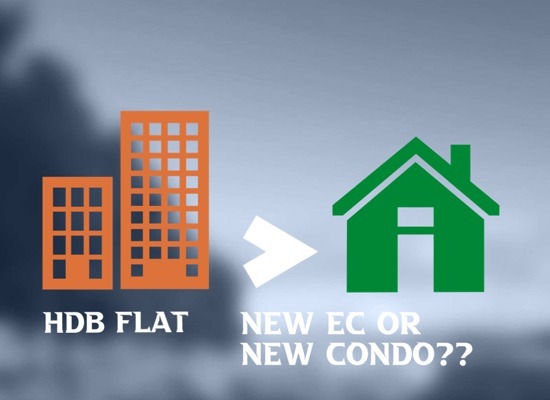If you’re looking to upgrade from your HDB flat, you might be wondering if you should go straight for a ‘regular’ condo or meet in the middle for a new executive condominium (ECs).
Executive condominiums were first introduced in 1999, and sold at a subsidized price to cater to the sandwich class of Singaporeans who dream of living in a condo but yet do not have the means to afford a ‘regular’ condo at the present market.
After reaching it’s 5-year minimum occupation period (MOP), ECs can be sold to Singaporean Citizens (SCs) and Permanent Residents (PRs). After 10 years from collecting keys, ECs become fully privatized, no longer bounded by any HDB rules or regulations, owners are free to sell the property to foreign buyers.
Then, the question is: If you’re a HDB upgrader looking to purchase a non-landed strata private property in the same area, which one is better and easier? Buying a new executive condominium (EC) or new ‘regular’ condominium?
New Executive Condominium or Private Condominium: Pros of new Executive Condominium
1. No Additionally Buyer Stamp Duty involved (ABSD)
As a new executive condominium (EC) launch is subjected to existing stringent HDB rules and regulations. No additional buyer stamp duty (ABSD) is imposed on the purchaser due to a required signed declaration form to HDB upon purchase, that the purchaser will sell their HDB in 6 months after collecting keys of the new EC.
2. Deferred Payment Scheme (DPS)
The deferred payment scheme may benefit owners who are still serving their existing HDB monthly mortgage installment. It allows the purchaser as the word implies, to place a 20% down payment and defer the progressive payment on the new EC till notice of the collection of keys (TOP) has been called for.
3. Accommodation Logistics Solution
On top of the deferred payment scheme, purchasers are allowed to hold their present HDB flats till temporary occupation permit (TOP) has been attained. This allows ease of moving from one property to another.
4. Subsidized entry prices compared to ‘regular’ condo
Let’s use ‘Provence Residences’ new EC and ‘The Watergardens at Canberra’ condo for an easier comparison example. According to the latest historical transactions of ‘Provence Residences’ EC, 3-bedrooms sold at a median price of $1,171 per square foot (psf).
New Executive Condominium or Private Condominium: Cons of new Executive Condominium
1. Eligibility conditions and Resale levy
New executive condominiums are subjected to the same HDB rules and regulations, yet even more stringent, where a household must consist of at least one Singapore Citizen (SC), and at least one other Singapore Citizen (SC) or Permanent Resident (PR). No other foreign spouse or individuals are allowed.
Additionally, a resale levy is imposed for the transition from 1st to 2nd subsidized HDB flat or new EC. The resale levy is subjected to the laws and conditions served within different time periods according to HDB rules and regulations.
2. 5 years minimum occupation period (MOP)
Likewise, the 5-years minimum occupation period (MOP) is applied to a new executive condominium.
3. 10 years to fully privatization of Executive Condominium
Foreigners are not yet able to purchase your EC property till after 10 years, when the EC has fully privatized. This means that your property, although has fulfilled it’s 5-years MOP and you are able to sell to SCs or PRs. It is still not yet fully exposed to the open market buyers who are shopping out there.
4. Loan is subjected to mortgage servicing ratio (MSR)
Buying a new executive condominium subjects the purchasers under HDB rules of loan, the mortgage servicing ratio (MSR), where only 30% of your gross salary is allow for repayment of monthly installment, which may result in a lower loan quantum.
5. More equity down payment due to a lesser loan quantum (in most cases)
With a lower loan quantum that does not satisfy the 75% loan-to-value (LTV) , purchasers tend to lack a certain amount within the purchase price, resulting in a shortfall of finances. This shortfall can be supplemented by cash, cpf or a bridging loan (if any is allowed, for existing HDB flat upgraders).
New Executive Condominium or Private Condominium: Pros of new Non-landed Private Condominium
1. No eligibility requirements or resale levy involved
There is no conditions, eligibility requirements or resale levy applied to new ‘regular’ condo purchase.
2. No minimum occupation period (MOP)
Clearly as a private condo status, there is no HDB rules and regulations such the minimum occupation period (MOP) involved.
3. 3-years Seller stamp duty (SSD) starts from the date of exercised sales and purchase agreement.
The 3-years seller stamp duty starts from the date of exercise, this means that your seller stamp duty will expire before collecting keys if you are one of the early birds to the new condo launch. It allows the purchaser to sell their property through a sub-sale transaction.
4. Materials may be of higher quality
The materials used by ‘regular’ condo developers may be of higher quality such as marble flooring, quartz kitchen counter-tops.etc in comparison to a new executive condominium (EC).
5. Real non-landed private condominium certified title
Certificate of titles (CTs) of new ‘regular’ condo launch are immediately of the private title designation other than the wait for 10-years for a new executive condominium to fully privatized.
New Executive Condominium or Private Condominium: Cons of new Non-landed Private Condominium
1. Can be more costly than a new executive condominium (EC)
2. Additional buyer stamp duty (ABSD) exposure
If you are a HDB upgrader, buying a new ‘regular’ condo exposes you to a 2nd property additional buyer stamp duty unless the HDB is sold before the exercised sales and purchase of the new ‘regular’ condo.
3. Accommodation logistic issue if you are need of a home
After the sale of your HDB, where do you stay? Do you have any alternative accommodation plans with family, relatives or friends? If not, rental accommodation and expenses have to be considered.
Advice to home buyers & Conclusion
Review your finances and timeline properly. If interim accommodation is not an option for you, a new executive condominium may be the right option to consider. Ultimately, it boils down to what is your objective to the move or home upgrade. Whether it is an investment or preferential home objective. No right no wrong.

